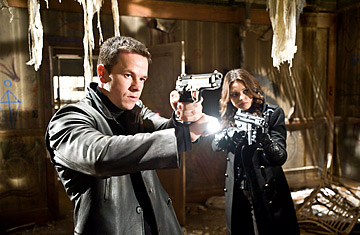
Mark Wahlberg as Max Payne, left, and Mila Kunis as Mona Sax in a scene from the movie Max Payne
An action movie based on a violent video game... and it's rated PG-13? Honestly, what's the point? I know PG-13 is the new R; the Motion Picture Association of America's ratings system is a lot more flexible-lenient-craven than it used to be. When Judd Apatow comedies and the grotty-Guignol The Dark Knight can secure the unrestricted rating, it's clear that the old sheriff has been replaced by a parole board. But if an R means anything, it's that moviegoers get to see the bone-cratering damage a fist can do to a face, get to feel the impact of a body splattering on a pavement, get to appreciate more than the contours of a luscious model who's removing her clothes. PG-13 is the tease; R is the payoff.
Max Payne, based on the search-and-destroy game created by Finland's "Sam Lake" (Sami Jarvi), is a tease in more ways than even the MPAA can imagine.
There's a long line of video-game-to-movie transfers — Super Mario Bros., Street Fighter, Mortal Kombat, Final Fantasy, Lara Croft: Tomb Raider, Doom, Resident Evil, Alone in the Dark, Hitman and DOA: Dead or Alive, not to mention about a quillion Japanese animes (Pokemon and its brethren) — and a seemingly infinite number of VG adaptations to come: film versions such game franchises as God of War, Gears of War, Metal Gear Solid, Lost Planet, Prince of Persia, EverQuest, Mass Effect, Uncharted: Drake's Fortune, the blessed Sims and, yikes, PacMan. (Can't wait for other retro movies based on the earliest video games: Frogger, Space Invaders and — some French minimalist director'll do it — Pong.)
I'll leave it to a true VG scholar like my colleague Lev Grossman to flesh out my theory that it's graphic novels, not video games, that have proved the more reliable source for good movies. Maybe it's that the adult comix provide stories, and storyboards, while the video games supply only a premise; or that reading an illustrated novel is closer to the movie-watching experience than the Zen numbness that overcomes gamesmen in their 27th hour at the console. That kind of sensory exhaustion is what the viewer feels before Max Payne has lumbered to its conclusion.
The makers of the Max movie — director John Moore, screenwriter Beau Thorne — want you to think of their effort as less video game than film noir. Or a Woo noir, since the picture owes a lot to the visual grit and zazz of John Woo, the Hong Kong director (A Better Tomorrow, The Killer, Hard Boiled) who made good in Hollywood with the crackerjack Face/Off. Surly men in overcoats trudge through a nightscape with very busy meteorology: when it isn't pouring rain there are snowflakes everywhere, like the residue from an Olympian pillow fight. And down these gaudily monochromatic streets a strong, scarred man comes into closeup: Max Payne, renegade cop.
